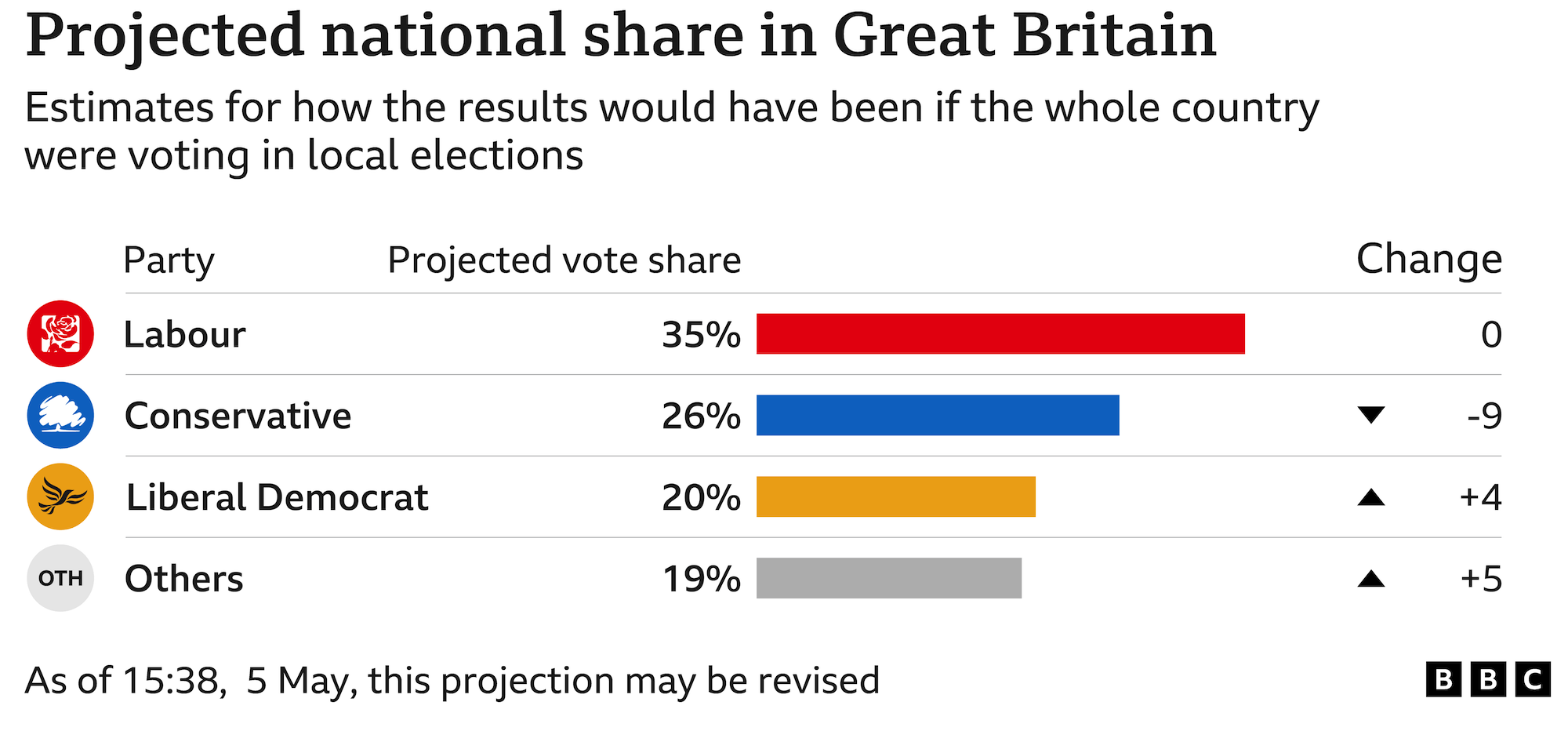By Sir John Curtice
Professor of Politics at Strathclyde University
Hopeful for Labour, encouraging for the Liberal Democrats and the Greens, but only a little short of calamitous for the Conservatives. These are the key messages to have emerged from the ballot boxes.
After all but 40 of the results were declared, Labour had made a net gain of nearly 450 seats, the Liberal Democrats well over 250, and the Greens more than 180.
The Conservatives, in contrast, had lost more than 800 seats and seem at serious risk of losing 1,000 seats in the final tally.
Meanwhile, Labour had gained control of 17 councils, and the Liberal Democrats seven.
Labour had particular reason to be pleased with its successes in Middlesbrough, Medway, Plymouth, Stoke-on-Trent, and Swindon, all of which were by far from guaranteed to fall into Labour's lap.
Among the Liberal Democrats' gains were Windsor and Maidenhead, and three councils in Devon - in the middle of their traditional former heartlands in the South West.
What could it mean for a general election?
However, these gains only tell us who is up and who is down since the last time most of the seats were contested.
That was in May 2019, when both the Conservatives and Labour were low in the polls in the wake of splits over Brexit.
They do not address the big question which politicians, commentators and the public want answered - namely, is Labour on course for a potential general election victory next year, as the polls suggest?
To answer that we need to take an in-depth look at votes cast.
The BBC has collected the detailed ward by ward voting figures in 45 of the 230 councils where elections were held on Thursday and used these to estimate the projected national share.
This represents an estimate of what the outcome would have been if all of Britain had had the chance to vote on Thursday, and those places that did not vote had followed the example of those that did.
According to this estimate, the Conservatives would have won 26% of the national vote, down two points on their poor performance in 2019 though a little above the worst ever local election outcomes for the party (in 1995 and 2013).
Labour's 35% puts them nine points ahead of the Conservatives, the largest lead that Labour has recorded in any local election since it lost power in 2010.
Nevertheless, while Labour's Projected National Share was seven points up on what it achieved in May 2019, the party's tally is no better than its score in last year's local elections. This raises questions about whether the outcome was more an expression of discontent with the government than enthusiasm for Labour's alternative.
Labour themselves were keen to emphasise that the results showed the party was ahead in many key parliamentary constituency battlegrounds.
Whilst true, that achievement too was much more the result of how much worse the Conservatives performed than at the December 2019 general election than because Labour were consistently winning bigger shares of the vote than in the last parliamentary contest.
Labour will, however, be pleased to have registered an above average performance in wards that voted heavily Leave in 2016. Recovering the support of Brexit-backing Britain has been one of the key objectives of Sir Keir Starmer's leadership.
A good result for the Lib Dems and Greens?
The Liberal Democrats continue to struggle to register progress in general election vote intention polls, but traditionally perform more strongly in council elections. They were defending one of their best performances in local elections since they went into coalition with the Conservatives in 2010.
They will no doubt be pleased that their share of the vote (20%) edged up a point on 2019, taking it to the highest level since 2010.
That said, the Liberal Democrats will be disappointed that in wards where they are challenging the Conservatives locally, there is little sign so far of them winning the tactical support of third-placed Labour supporters.
Securing such tactical votes could well be crucial to the party's chances of capturing seats from the Conservatives at the next general election.
Given the difficulties smaller parties typically have in winning seats under the first-past-the-post electoral system, the Greens have done well to make more than 180 gains. And, for the first time ever, they have gained overall control of a local council: Mid-Suffolk.
In terms of votes, the party has so far performed close to the record level of support won four years ago.
Politics at Westminster might be dominated by the Conservatives and Labour, but the political stripes of English local government are now rather more variegated.
Sir John Curtice is Professor of Politics, Strathclyde University, and Senior Research Fellow, NatCen Social Research and The UK in a Changing Europe. Additional analysis by Patrick English, Stephen Fisher, Robert Ford and Dan Snow.
